With inflation rising and COVID-19 still prevalent worldwide, funding and risk capacity have become unpredictable. This article will introduce how a backup budget can be a helpful resource for accurately measuring risk capacity.
What is a Backup Budget?
A Backup Budget is a minimum amount you would be willing to spend on your living standard. There are a few ways someone can calculate their backup budget. The first and traditional method is to go through your regular budget and remove any nonessential spending by category. Perhaps that country club membership is something you could sacrifice for the ability to take more stock risk. Or maybe you could stop dining out frequently and start cooking at home. Second, your spending during the pandemic might be a good proxy for a Backup Budget. Whether this method to risk capacity makes sense to you may come down to how flexible you are willing to be about your living standard. A Backup Budget may be an excellent option depending on how you answer the following prompts. First, are you flexible in terms of your living standard? And secondly, are you currently living within your means?
Spending Variations
There are three types of households when it comes to spending and finances. First are people who are spending more than what they can afford. In other words, these households’ spending habits exceed their sustainable living standard. Second, are households whose spending is pretty much equal to what they can afford. And lastly are households who spend less than what they could afford. This type of spending leads to a surplus. What they do not spend on everyday necessities, they save.
When a household spends less than their living standard, they create an opportunity for financial flexibility. A backup budget is a good choice for people who reach a flexible living standard. A backup budget would allow you to take even more risk — more than just the surplus, but you may have to decrease your typical spending habits if market returns are poor. Nevertheless, if you live within your means and your living standard is not flexible, there is no reason for a backup budget. Overall, your current living situation dictates risk capacity.
Conclusion
Ultimately, lots of variables can influence a household’s risk capacity. Working for a more extended period, downsizing your living situation later in life, or accessing home equity with a reverse mortgage can increase financial flexibility.
A backup budget under specific circumstances is another factor that can inform risk capacity. If your spending is flexible and you like the idea of a backup budget, you should contact your financial advisor about incorporating this approach into your financial plan.
This blog/website is only made available for educational purposes. It is designed to give visitors general information and a general understanding of select financial topics. It is not intended to provide specific financial or investment advice. Conduct your own due diligence or consult a licensed financial advisor/broker before making any and all financial/investment decisions.

